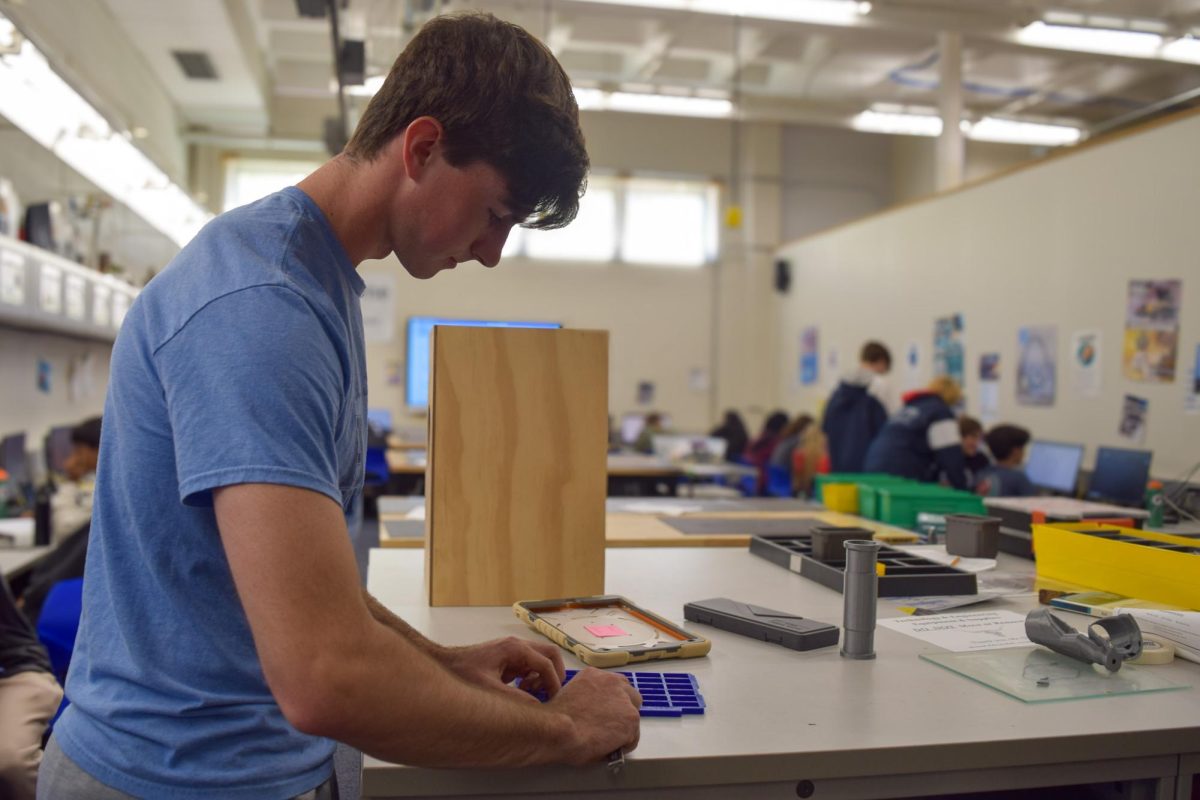Living in a English speaking country with a seven hour time difference from her mother and brother, junior Natalie Senger has adapted to her new reality of studying abroad. Senger arrived Aug. 13 from Hamburg, Germany and will live with Tom and Katherine Korte until June 30, 2015.
“Of course I wanted to come to a country where the people speak English,” Senger said. “England was my first choice because they speak more formal English and it was closer to home, but I like it here too.”
International exchange programs vary in degrees of reliability. Senger’s program, the American Field Service (AFS), ensures that students are in safe homes that have a desire to host students because of the experience – not for the money that comes with hosting.
“I used to be in a different program, but then I heard some pretty bad rumors about the host families in those programs so I switched. One boy lived in a room as small as Harry Potter’s. Another boy who was living in Montana got shot one month before he was supposed to return home to Hamburg,” Senger said.
The process of finding a host family took one year.
“When you think of the United States, you think of New York and California, never Missouri! I have been pleasantly surprised about living in the Midwest,” Senger said.
After living in Saint Louis for two months, Senger has noted some differences between the culture of the midwest and her homeland.
“It seems funny that you drive everywhere, even if it’s less than a mile away. In Germany, we walk places, ride bikes or take public transportation. I don’t understand why it isn’t that way here?” Senger said.
Senger also noted the variance of how people interact socially.
“I think when people ask you how you are doing they may not always mean it. It seems like more of a habit than them really caring about how you are. In Germany, when someone wants to know how you are doing, they sit down and talk with you rather than just say ‘good’ or ‘fine’ really fast,” Senger said.
The stereotypes of Americans being selfish have held true for Senger.
“I can’t believe how people push each other around in the halls to get to class. If everyone would just walk together they could all get to class on time without anyone getting hurt. It’s like war or something,” Senger said.
Another stereotype that rang true to Senger was the unhealthy yet appealing quality of American food.
“American food does taste really good, especially Bread Co. which is amazing! It’s the best to get a blueberry bagel with cream cheese since we don’t have that in Germany. I’ll miss it when I go home. But I know how bad and greasy the food is here too, I’ve already gained 8 pounds in just two months. I guess it’s just funny to me how processed the food is here. Like carrots, why are they unpeeled and so small?” Senger said.
The educational system in America also has been a new experience for Senger.
“The building is much smaller and dirtier in Germany. Many German teenagers smoke everywhere – even at school! I’ve never seen anyone do that here which is very nice. I am also not used to having a water fountain and vending machines in school either,” Senger said.
Senger does not earn credit for the time she spends at Parkway West. In fact, she will need to repeat this school year when she returns to Hamburg.
“I don’t get credit for school here because my German school is much harder. For instance, I took Algebra II two years ago, but here I am taking it again! Even though it’s the same class again, it’s very different. You use Smartboards and check your homework answers with an app that reads QR codes. Another difference between education here is that the grading systems are very different. Instead of earning an A, B, C, D, or F we use a number system from 1-6. Basically, a 1 equals an A,” Senger said.
However, the most impactful difference in schooling for Senger is having homework.
“In Germany, our school day goes from 8 a.m. – 4p.m., but here after a full day of school I go home and do more school! I feel like I’m drowning in homework!” Senger said.
Despite differences between Midwestern American culture and that of Germany, Senger has so far enjoyed her sojourn.
“I’ve been to a Cardinal’s game, the Arch, the symphony and the Bastille and One Direction concerts. Bastille is my favorite American band and I used to like One Direction- but not anymore. It’s funny because even though I’ve been learning English for five years, listening to One Direction is really what helped me understand the language!” Senger said.
Besides visiting St. Louis attractions, Senger will have the opportunity to see her brother perform at Carnegie Hall in New York during the January of 2015.
“This is a once in a lifetime opportunity and I almost wasn’t able to go. For the AFS we have four meetings that we have to go to so the agency can check in to see how I’m doing. It just so happened that the weekend one of my meetings was scheduled that my brother is playing in Carnegie Hall. I had to fight really hard for them to change it, but thankfully they did, but it’s because of the AFS meetings that I’m not able to go to Homecoming,” Senger said.
Senger has kept in touch with her family via Skype despite the seven hour time difference.
“We usually talk twice a month because otherwise I get homesick. When I talk with my mom, brother and grandparents, who live ten minutes away from me in Hamburg, they always want to know what America is like. I know I’ll have lots of stories to share when I’m home.”
Living in St. Louis has taught Senger about how to be flexible no matter the circumstance.
“It’s interesting where life leads you and I’m happy with how it’s turning out,” Senger said.



![Focused on providing exceptional service, sophomore Darsh Mahapatra carefully cleans the door of a customer’s car. Mahapatra has always believed his customers deserve nothing less than the best. “[If] they’re trusting us with their car and our service, then I am convinced that they deserve our 100 percent effort and beyond,” Mahapatra said.](https://pwestpathfinder.com/wp-content/uploads/2025/10/DSC_0018-1200x800.jpg)
![Sophomore Aleix Pi de Cabanyes Navarro (left) finishes up a soccer game while junior Ava Muench (right) warms up for cross country practice. The two came to Parkway West High School as exchange students for the 2025-2026 school year. “The goal for the [exchange] program is to provide opportunities for both Parkway students and our international exchange students to learn about other cultures, build connections and become confident, capable, curious and caring — Parkway’s Four C’s — in the process,” Exchange Program Lead Lauren Farrelly said.](https://pwestpathfinder.com/wp-content/uploads/2025/10/Feature-Photo-1200x800.png)

![Gazing across the stage, sophomore Alexis Monteleone performs in the school theater. The Monteleone family’s band “Monte and the Machine” has been releasing music since 2012, but Alexis started her own solo career in 2024 with the release of her first single, Crying Skies. “My whole family is very musical, [and I especially] love writing [songs with them],” Monteleone said.](https://pwestpathfinder.com/wp-content/uploads/2025/09/DSC7463-1200x798.jpg)
![Amid teaching a lesson to her AP Calculus BC class, Kristin Judd jokes alongside her students in their funny remarks. Judd has always enjoyed keeping the mood light in her classroom, along with on the volleyball court. “[I enjoy] that side talk where you see [or] overhear a conversation and chime in, or somebody says something funny,” Judd said.](https://pwestpathfinder.com/wp-content/uploads/2025/09/image-1200x730.jpg)
![Eyeing the ball, junior Ella McNeal poses for her commitment pictures at Clemson University. McNeal’s commitment comes after months of contact with top Division 1 soccer programs. “ It has taken a lot to get to where I am, but I know that [what] I've already been through is just the beginning, and I can't wait for what is to come,” McNeal said.](https://pwestpathfinder.com/wp-content/uploads/2025/09/IMG_4926-1200x900.jpeg)


![Senior Adam Zerega stands with senior Dexter Brooks by farm equipment. Zerega often worked with friends and family on his farm. “I've been able to go to my family's farm since I was born. I [spend] at least three weekends a month [on the farm], so I'm there all the time,” Zerega said.](https://pwestpathfinder.com/wp-content/uploads/2025/04/IMG_4872-1200x900.jpg)

![Leaning on the podium, superintendent Melissa Schneider speaks to Parkway journalism students during a press conference. Schneider joined Parkway in July after working in the Thompson School District in Colorado. “My plan [to bond with students] is to get things on my calendar as much as possible. For example, being in [classes] is very special to me. I am trying to be opportunistic [meeting] kids [and] being in [the school] buildings. I have all the sports schedules and the fine arts schedules on my calendar, so that when I'm available, I can get to them,” Schneider said.](https://pwestpathfinder.com/wp-content/uploads/2025/09/IMG_5425-1200x943.jpeg)

![Leaping through the air, senior Tyler Watts celebrates his first goal of the season, which put the Longhorns up 1-0 against the Lafayette Lancers. Watts decided to play soccer for West for his last year of high school and secured a spot on the varsity roster. “[Playing soccer for West] is something I had always dreamed of, but hadn’t really had a good opportunity to do until now. It’s [really] fun being out [on the field], and I’m glad I decided to join the team. It’s just all about having fun with the boys and enjoying what time we have left together,” Watts said.](https://pwestpathfinder.com/wp-content/uploads/2025/09/DSC_1951-1200x855.jpg)

![Junior Fiona Dye lifts weights in Strength and Conditioning. Now that the Trump administration has instituted policies such as AI deregulation, tariffs and university funding freezes, women may have to work twice as hard to get half as far. "[Trump] wants America to be more divided; he wants to inspire hatred in people,” feminist club member and junior Clara Lazarini said.](https://pwestpathfinder.com/wp-content/uploads/2025/05/Flag.png)
![As the Trump administration cracks down on immigration, it scapegoats many immigrants for the United States’ plights, precipitating a possible genocide. Sophomore Annabella Whiteley moved from the United Kingdom when she was eight. “It’s pretty scary because I’m on a visa. When my visa expires next year, I’m not sure what’s going to happen, especially with [immigration] policies up in the air, so it is a concern for my family,” Whiteley said.](https://pwestpathfinder.com/wp-content/uploads/2025/05/DSC_0077-7copy.jpg)
![Shifting global trade, President Donald Trump’s tariffs are raising concerns about economic stability for the U.S. and other countries alike. “[The tariffs are] going to pose a distinct challenge to the U.S. economy and a challenge to the global economy on the whole because it's going to greatly upset who trades with who and where resources and products are going to come from,” social studies teacher Melvin Trotier said.](https://pwestpathfinder.com/wp-content/uploads/2025/05/MDB_3456-1200x800.jpg)

![Pitching the ball on Apr. 14, senior Henry Wild and his team play against Belleville East. Wild was named scholar athlete of the year by St. Louis Post-Dispatch after maintaining a high cumulative GPA and staying involved with athletics for all of high school. “It’s an amazing honor. I feel very blessed to have the opportunity to represent my school [and] what [it] stands for,” Wild said.](https://pwestpathfinder.com/wp-content/uploads/2025/05/unnamed-6-1200x714.jpg)
![Red, white and blue, the American flag holds the values of our democracy. The fight that we once endured has returned, as student journalists and senior correspondents across the country are losing their voices due to government control. “[Are] the White House and [the] government limiting free speech [and] freedom of the press? Yes [they are],” chief communications officer of the Parkway School District and former journalist Elisa Tomich said.](https://pwestpathfinder.com/wp-content/uploads/2025/03/Untitled-design-14.jpg)
